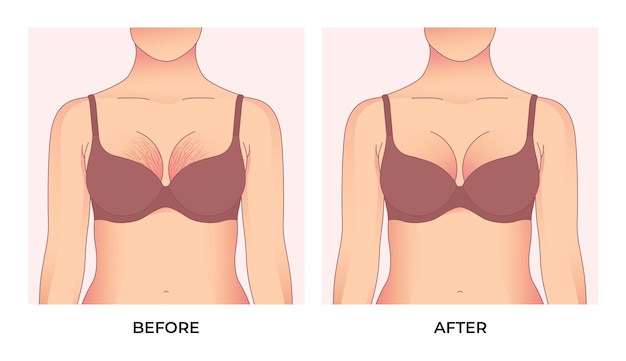20 lb Weight Loss After Breast Reduction

Introduction
Many women opt for breast reduction surgery to alleviate the physical and emotional discomfort associated with large breasts. While the primary objective of the procedure is to reduce breast size and alleviate related symptoms, an unexpected but positive outcome for some individuals is significant weight loss. In this article, we explore the connection between weight loss and breast reduction surgery and provide tips for achieving and maintaining a healthy weight after the procedure.
Understanding Breast Reduction Surgery
Breast reduction surgery, also known as reduction mammoplasty, is a surgical procedure that aims to decrease the size and weight of the breasts. During the procedure, excess breast tissue, fat, and skin are removed, resulting in smaller and more proportionate breasts. The surgery not only improves physical discomfort but also enhances body confidence and self-esteem.
The Relationship Between Weight Loss and Breast Size
Weight loss and breast size are interconnected, although the extent of the impact varies from person to person. While losing weight does not specifically target breast tissue, it can lead to a reduction in overall body fat, including fat stored in the breasts. As a result, the breasts may decrease in size, contributing to weight loss.
Benefits of Weight Loss After Breast Reduction
Experiencing weight loss after breast reduction surgery can bring numerous benefits to individuals. Some advantages include:
- Enhanced Physical Comfort: With a reduced breast size, individuals may experience relief from physical discomfort, such as back, neck, and shoulder pain.
- Improved Posture: Large breasts can strain the muscles and spine, leading to poor posture. Weight loss after breast reduction can alleviate this issue, promoting better alignment.
- Increased Mobility: Excess breast weight can limit mobility and hinder participation in physical activities. Shedding pounds after the surgery can enhance overall mobility and make exercise more enjoyable.
- Clothing Options: Weight loss after breast reduction may lead to a broader range of clothing options, allowing individuals to wear styles they previously couldn’t comfortably.
Tips for Successful Weight Loss After Breast Reduction
Achieving and maintaining weight loss after breast reduction surgery requires a holistic approach. Consider the following tips to optimize your weight loss journey:
A Healthy Diet for Weight Loss
To promote weight loss, focus on adopting a well-balanced, nutritious diet. Incorporate plenty of fruits, vegetables, whole grains, lean proteins, and healthy fats into your meals. Limit processed foods, sugary snacks, and beverages high in calories. Consult with a registered dietitian for personalized guidance on creating a meal plan that suits your needs.
Incorporating Exercise into Your Routine
Regular physical activity plays a vital role in weight loss and overall health. Engage in a combination of cardiovascular exercises, such as jogging, swimming, or cycling, and strength training exercises to build lean muscle mass. Aim for at least 150 minutes of moderate-intensity aerobic activity or 75 minutes of vigorous-intensity aerobic activity each week, along with strength training exercises twice a week.
Mindful Eating for Weight Loss
Practicing mindful eating can help you develop a healthier relationship with food and prevent overeating. Pay attention to hunger and fullness cues, eat slowly, and savor each bite. Avoid distractions while eating, such as watching television or using electronic devices. By being present during meals, you can better control portion sizes and make conscious food choices.
Building a Support System
Embarking on a weight loss journey after breast reduction surgery can be challenging, but having a support system can make a significant difference. Seek support from friends, family, or a support group who can provide encouragement, accountability, and understanding. Consider consulting with a mental health professional who specializes in body image and eating disorders if you require additional support.
Embracing a Positive Body Image
Weight loss should be motivated by a desire for overall health and well-being rather than solely focusing on appearance. Embrace a positive body image and practice self-acceptance throughout your weight loss journey. Celebrate your achievements, no matter how small, and focus on the positive changes you’re experiencing.
Maintaining Long-Term Weight Loss
Sustainable weight loss is a long-term commitment. Once you have achieved your weight loss goals, it’s crucial to maintain your progress. Continue practicing healthy eating habits and regular exercise. Monitor your weight regularly, and address any weight fluctuations promptly to prevent significant regain. Be patient and kind to yourself throughout the process.
Precautions and Considerations
While weight loss after breast reduction surgery can be beneficial, it’s essential to approach it with caution. Consider the following precautions and consult with your healthcare provider before initiating a weight loss plan:
- Follow post-surgical instructions: Adhere to the guidelines provided by your surgeon regarding physical activity, recovery period, and wearing supportive garments.
- Allow adequate healing time: Give your body sufficient time to heal after surgery before engaging in vigorous exercise or drastic weight loss efforts.
- Seek professional guidance: Consult with your healthcare provider or a registered dietitian to develop a personalized weight loss plan that considers your specific needs and medical history.
- Monitor changes in breast size: Keep an eye on changes in breast size during the weight loss process. If you experience significant changes or concerns, consult with your surgeon to ensure there are no underlying complications.
Conclusion
Weight loss after breast reduction surgery can be an unexpected but welcome outcome for individuals seeking relief from physical discomfort and body confidence. By adopting a healthy lifestyle, including a nutritious diet, regular exercise, and a positive mindset, you can achieve successful weight loss and maintain it in the long term. Embrace your journey, be patient, and celebrate your achievements along the way.
FAQs
1. Will weight loss after breast reduction surgery cause my breasts to sag?
Weight loss can affect breast tissue differently for each person. While some individuals may experience slight sagging, others may not. Regular exercise, including chest exercises, can help tone and strengthen the chest muscles, providing support to the breasts.
2. How soon can I start exercising after breast reduction surgery?
It’s crucial to follow your surgeon’s instructions regarding physical activity after breast reduction surgery. Generally, low-impact exercises, such as walking, can be resumed a few weeks after the procedure. However, consult with your surgeon for personalized guidance based on your recovery progress.
3. Can I breastfeed after having a breast reduction surgery?
Breast reduction surgery may impact breastfeeding ability, as it involves removing breast tissue and reshaping the breasts. However, it’s still possible to breastfeed after the procedure, although it may require additional support and assistance. Discuss your plans for breastfeeding with your surgeon before undergoing the surgery.
4. How long does it take to see weight loss results after breast reduction surgery?
Weight loss results can vary from person to person.



